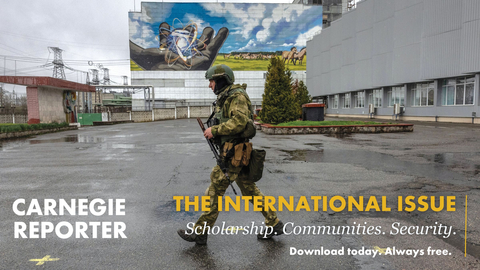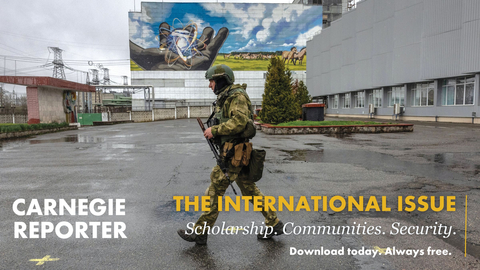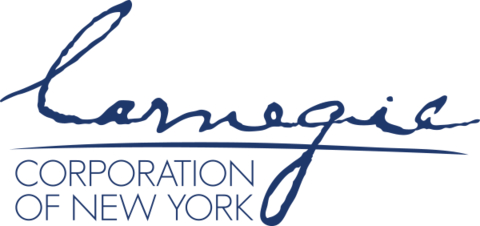NEW YORK--(BUSINESS WIRE)--Now more than ever, knowledge and understanding of complex international issues are critical to the advancement of a more secure world. The Fall 2023 edition of the Carnegie Reporter magazine, published by the philanthropic foundation Carnegie Corporation of New York, examines complex topics critical to global security, from U.S.-China relations to the costs of war and nuclear proliferation, and highlights the importance of bridging the gap between academics and policymakers.
“It has never been more important to promote knowledge and understanding of international security issues, to forge global networks of scholars working in related areas, and to remove barriers between scholarship and policymaking,” says Dame Louise Richardson, president of Carnegie Corporation of New York. “The most recent edition of the Carnegie Reporter magazine examines some of the most pressing issues of our time, and the efforts of the Corporation to promote knowledge and peace alongside them.”
The new edition highlights research from the Costs of War project, which reveals the costs of the U.S. post-9/11 wars in Iraq, Afghanistan, and elsewhere in human, economic, and political terms. “There are reverberating costs, the human cost of war, that people in the United States, for the most part, don’t really know or think enough about,” said Stephanie Savell, codirector of the Costs of War project. Commenting on the extent of war-related deaths, refugees, and budgetary costs, cofounder and codirector Neta C. Crawford remarks, “It’s hard to convey the cost in lives because of these wars. It’s very tough to talk about it. But we have to.”
Among the articles:
- Movements for Peace: The inspirational story of how Corporation trustee and 2011 Nobel Peace Prize laureate Leymah Gbowee led a women’s rights movement to end Liberia’s 14-year civil war in 2003: “We succeeded when no one thought we would; we were the conscience of the ones who had lost their consciences in their quest for power and political positions. We represented the soul of the nation.”
- Foreign Policy Begins at Home: Richard Haass, president emeritus of the Council on Foreign Relations, argues in his new book, The Bill of Obligations, that the biggest threat to America’s foreign policy comes from the deterioration of American democracy itself: “What is at stake does not end at the water’s edge, at the country’s borders. A United States that is divided and defined by politics will be in no condition to set an example that others will want to emulate.”
- Can Knowledge Make the World More Secure? The Corporation’s Deana Arsenian reflects on how a lack of understanding has contributed to devastating outcomes throughout history and why the Corporation’s longstanding efforts to advance knowledge remain vital today: “The Corporation continues to be guided by Andrew Carnegie’s vision that knowledge is essential to societal progress. But this proposition is increasingly tested in today’s fractured, divided, and conflictual world dominated by social media and a glut of information, misinformation, and disinformation offered by humans or generated by bots.”
- Scholarship in Action: The Corporation’s Stephen J. Del Rosso writes about the Corporation’s efforts to build a network of policy-oriented scholars who have a real-world impact on foreign policy decision-making, including bringing Brittney Griner home, preparing for war in Ukraine, and contributing to conversations about China and U.S. foreign policy: “Carnegie Corporation of New York is motivated by the belief that good policy is informed by good ideas –– and good ideas are not formed in a vacuum.”
- Nuclear Weapons and You: From possible nuclear use by Russia to the role of artificial intelligence in nuclear command and control, Sharon K. Weiner and Samara Shaz argue that now is the time for Americans to learn more about nuclear weapons, especially with the United States set to spend an estimated $1.7 trillion to modernize its arsenal over the next 30 years,: “Nuclear weapons policy tends to be made by a very small number of people and either in secret or with little public scrutiny. This includes the ultimate nuclear decision: whether or not to use the weapons.”
Additional Highlights
The new edition also taps into experts and grantees in various fields to challenge thinking on crucial issues, including: “How to Stabilize U.S.-China Relations” and “How Should the U.S. Address Nuclear Dangers?” Plus, a discussion on global nuclear dynamics with Laicie Heeley, host of the Things That Go Boom podcast; a Q&A on U.S. migration policy with Andrew Selee, president of the Migration Policy Institute; how to improve K–12 science education in the U.S. over the next decade; and a call from Georgetown University professor and Andrew Carnegie Fellow Marcia Chatelain for colleges and universities to normalize access for first-generation and minority students “as firmly as they have normalized football.”
For more information, visit the Fall 2023 edition of the Carnegie Reporter here.
Not a subscriber yet? Subscribe to receive the print version of the magazine and the foundation’s newsletters. These resources for knowledge to inspire informed action are always free!
The Carnegie Reporter has been the flagship “magazine of ideas” for Carnegie Corporation of New York for more than 20 years, assessing emerging trends and urgent challenges and offering ideas to inspire informed action because #WeHaveIdeas. Readers are encouraged to republish or excerpt articles by seeking permission from the foundation. #Carnegie Reporter
About Carnegie Corporation of New York:
Carnegie Corporation of New York was established by Andrew Carnegie in 1911 to promote the advancement and diffusion of knowledge and understanding. In keeping with this mission, the Corporation’s work focuses on the issues that Carnegie considered of paramount importance: democracy, education, and international peace. @CarnegieCorp




